No 11431994 THE ALCOHOL ACT
选修六unit3知识点

选修六unit3知识点选修六 Unit 3 知识点一、重点词汇1、 cigarette:名词,意为“香烟;纸烟”。
例如:He lit a cigarette and sat down(他点燃一支香烟,然后坐了下来。
)2、 alcohol:名词,意为“酒;酒精”。
例如:Alcohol is bad for your health(酒精对你的健康有害。
)3、 abuse:名词,意为“滥用;虐待;辱骂”。
动词,意为“滥用;虐待;辱骂”。
例如:Drug abuse is a serious problem(滥用药物是一个严重的问题。
)He abused his power(他滥用职权。
)4、 stress:名词,意为“压力;重音;强调”。
动词,意为“强调;着重;使紧张”。
例如:She's under a lot of stress(她压力很大。
)The teacher stressed the importance of reading(老师强调了阅读的重要性。
)5、 ban:名词,意为“禁令;禁止”。
动词,意为“禁止;取缔”。
例如:There is a ban on smoking in public places(公共场所禁止吸烟。
)The government banned the use of certain chemicals(政府禁止使用某些化学物质。
)6、 due:形容词,意为“到期的;预期的;应得的”。
例如:The rent is due at the end of the month(租金月底到期。
)His success is due to hard work(他的成功归功于努力工作。
)7、 tough:形容词,意为“困难的;强硬的;坚韧的”。
例如:It's a tough problem to solve(这是个很难解决的问题。
)He's a tough guy(他是个硬汉。
葡萄酒对应的各种英语说法
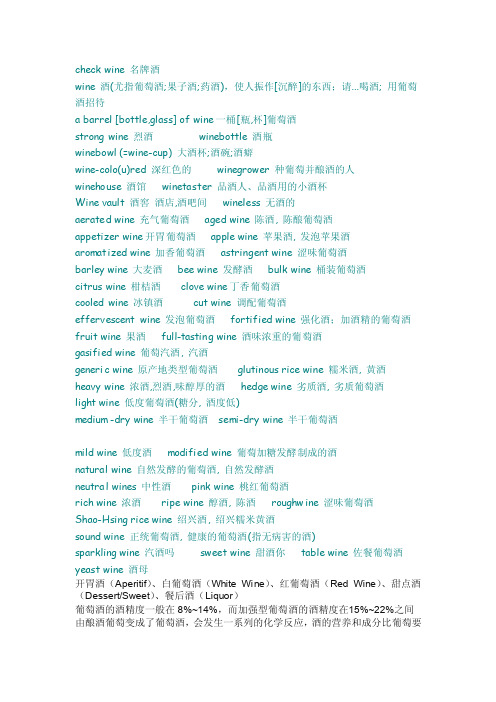
check wine 名牌酒wine 酒(尤指葡萄酒;果子酒;药酒),使人振作[沉醉]的东西;请...喝酒; 用葡萄酒招待a barrel[bottle,glass] of wine一桶[瓶,杯]葡萄酒strongwine 烈酒winebot tle 酒瓶winebow l (=wine-cup) 大酒杯;酒碗;酒癖wine-colo(u)red 深红色的winegro wer 种葡萄并酿酒的人winehou se 酒馆winetas ter 品酒人、品酒用的小酒杯Wine vault 酒窖酒店,酒吧间wineles s 无酒的aerated wine 充气葡萄酒aged wine 陈酒, 陈酿葡萄酒appetiz er wine开胃葡萄酒apple wine 苹果酒, 发泡苹果酒aromati zed wine 加香葡萄酒astring ent wine 涩味葡萄酒barleywine 大麦酒bee wine 发酵酒bulk wine 桶装葡萄酒citruswine 柑桔酒clove wine丁香葡萄酒cooledwine 冰镇酒cut wine 调配葡萄酒efferve scentwine 发泡葡萄酒fortifi ed wine 强化酒;加酒精的葡萄酒fruit wine 果酒full-tasting wine 酒味浓重的葡萄酒gasifie d wine 葡萄汽酒, 汽酒generic wine 原产地类型葡萄酒glutino us rice wine 糯米酒, 黄酒heavy wine 浓酒,烈酒,味醇厚的酒hedge wine 劣质酒, 劣质葡萄酒light wine 低度葡萄酒(糖分, 酒度低)medium-dry wine 半干葡萄酒semi-dry wine 半干葡萄酒mild wine 低度酒modifie d wine 葡萄加糖发酵制成的酒natural wine 自然发酵的葡萄酒, 自然发酵酒neutral wines 中性酒pink wine 桃红葡萄酒rich wine 浓酒ripe wine 醇酒, 陈酒roughwi ne 涩味葡萄酒Shao-Hsing rice wine 绍兴酒, 绍兴糯米黄酒sound wine 正统葡萄酒, 健康的葡萄酒(指无病害的酒)sparkli ng wine 汽酒吗sweet wine 甜酒你table wine 佐餐葡萄酒yeast wine 酒母开胃酒(Aperiti f)、白葡萄酒(White Wine)、红葡萄酒(Red Wine)、甜点酒(Dessert/Sweet)、餐后酒(Liquor)葡萄酒的酒精度一般在8%~14%,而加强型葡萄酒的酒精度在15%~22%之间由酿酒葡萄变成了葡萄酒,会发生一系列的化学反应,酒的营养和成分比葡萄要丰富多了。
葡萄酒常识中英双语
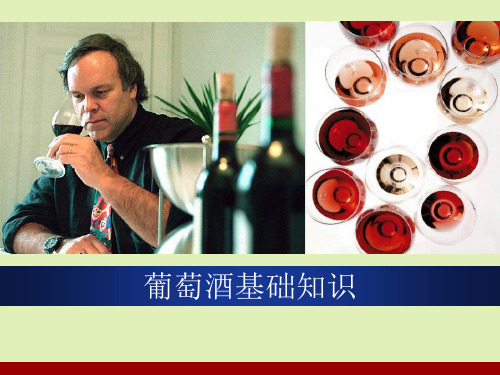
葡萄酒的简史 Wine History
埃及人和腓尼基人是闪族人的两大贸易合作伙伴 Two groups with whom the Sumerians traded were the Egyptians and the Phoenicians 腓尼基人 (1100 B.C. 开始在欧洲各地运输葡萄树)1100 B.C. 商业社会,开始在欧洲各地运输葡萄树 Phoenicians (Start to transport vines around Europe ) 1100 B.C. Mercantile society started to transport vines around Europe 最出色的航海家。地中海盆地-北非-南欧-西不骆驼岩山, The finest sea travelers in their age. Mediterranean basin and established colonies in north Africa and in southern Europe as far as the Rock of Gibraltar. Wine drinkers go, vine goes too
葡萄酒的简史 Wine History
希腊人 Greeks 日常健康饮料 social beverage 殖民欧洲. 带葡萄树回家. 贡献:将新葡萄酒品种核心技术 引进法国南部,西班牙,最重要的是意大利
Colonizes Europe. Brought vines to permanent home. Contribution:spread vine, brought new grapes and new techniques to southern France, Spain, and perhaps most importantly ,to southern Italy.
法国葡萄酒酒标常用词汇中英文对照表

法国葡萄酒酒标常用词汇中英文对照表法国葡萄酒酒标常用词汇中英文对照表作者:红酒久久对于葡萄酒新手来说,酒标是比较难看懂的,而且各个国家的酒标都有所不同,这更添加了难度,现在红酒人把主要几个国家的葡萄酒酒标上的常用语英汉对照整理出来,希望对大家有用。
法国葡萄酒酒标常用词汇中英文对照表以下为法国酒标上的一些常用语介绍,这些用语可以帮助您多认识一点葡萄酒喔。
Appellation......Controlee:法定产区等级葡萄酒,简称AOC。
通常在.......加入被认定为AOC酒的地域名,例如AppellationBordeauxControlee指的就是波尔多的AOC酒。
Blanc:白葡萄酒。
Chateau:城堡酒庄。
Cave cooperative:合作酒厂。
Cru:葡萄园Grand Cru:最优良的特等葡萄园。
Grand Cru Class意思就是〝高级品〞Demi sec:半干型葡萄酒,含些微糖份。
Doux:甜葡萄酒。
Domaine:独立酒庄。
Mis En Bouteille:装瓶。
以在酒庄装酒为最佳,称为〝酒庄原装酒〞Negociant:葡萄酒仲介商。
酒商会和葡萄酒栽种者签订合约,然后看是要原酒或是另行调配装瓶出售。
Proprietaire recoltant:自产葡萄、酿酒的葡萄农。
Premier cru:次于特等葡萄园但优于一般等级的葡萄园。
Rouge:红葡萄酒。
Rose:玫瑰红酒。
Sec:干型葡萄酒,不含糖份。
VIN:葡萄酒。
VDQS:上好指定酒。
Vin de Pays:产地酒。
是仅限定葡萄产地的葡萄酒,其限定较AOC所规定的少,价钱也比较和理。
Vin de Table:普通餐酒。
不受规定约束的酒,任何产地的葡萄酒都可以拿来混合酿造。
藉由混合酿造来降低成本是这种酒的特征,美味与否全凭生产者的巧手,无等级之分。
意大利葡萄酒酒标常用词汇中英文对照表Abbocato:甜酒Amabile:微甜酒Amaro:略带苦味的酒Annata:年Ascutto:干酒,也就是不含糖份的意思。
葡萄酒常用英文术语
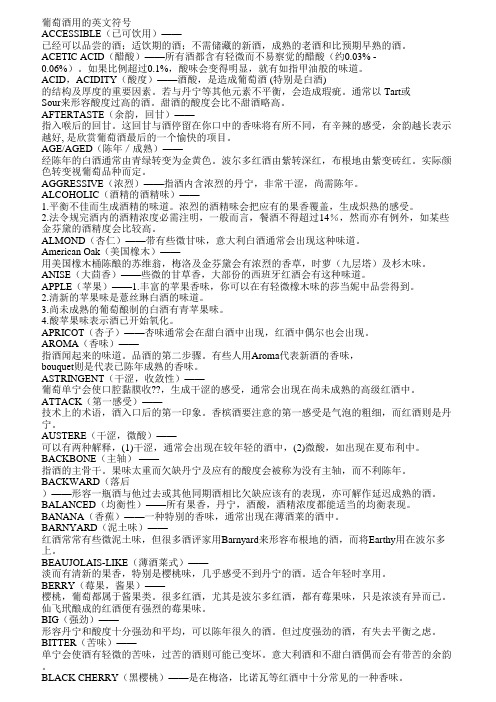
葡萄酒用的英文符号ACCESSIBLE(已可饮用)——已经可以品尝的酒;适饮期的酒;不需储藏的新酒,成熟的老酒和比预期早熟的酒。
ACETIC ACID(醋酸)——所有酒都含有轻微而不易察觉的醋酸(约0.03% -0.06%)。
如果比例超过0.1%,酸味会变得明显,就有如指甲油般的味道。
ACID,ACIDITY(酸度)——酒酸,是造成葡萄酒 (特别是白酒)的结构及厚度的重要因素。
若与丹宁等其他元素不平衡,会造成瑕疵。
通常以 Tart或Sour来形容酸度过高的酒。
甜酒的酸度会比不甜酒略高。
AFTERTASTE(余韵,回甘)——指入喉后的回甘。
这回甘与酒停留在你口中的香味将有所不同,有辛辣的感受,余韵越长表示越好, 是欣赏葡萄酒最后的一个愉快的项目。
AGE/AGED(陈年/成熟)——经陈年的白酒通常由青绿转变为金黄色。
波尔多红酒由紫转深红,布根地由紫变砖红。
实际颜色转变视葡萄品种而定。
AGGRESSIVE(浓烈)——指酒内含浓烈的丹宁,非常干涩,尚需陈年。
ALCOHOLIC(酒精的酒精味)——1.平衡不佳而生成酒精的味道。
浓烈的酒精味会把应有的果香覆盖,生成炽热的感受。
2.法令规完酒内的酒精浓度必需注明,一般而言,餐酒不得超过14%,然而亦有例外,如某些金芬黛的酒精度会比较高。
ALMOND(杏仁)——带有些微甘味,意大利白酒通常会出现这种味道。
American Oak(美国橡木)——用美国橡木桶陈酿的苏维翁,梅洛及金芬黛会有浓烈的香草,时萝(九层塔)及杉木味。
ANISE(大茴香)——些微的甘草香,大部份的西班牙红酒会有这种味道。
APPLE(苹果)——1.丰富的苹果香味,你可以在有轻微橡木味的莎当妮中品尝得到。
2.清新的苹果味是薏丝琳白酒的味道。
3.尚未成熟的葡萄酿制的白酒有青苹果味。
4.酸苹果味表示酒已开始氧化。
APRICOT(杏子)——杏味通常会在甜白酒中出现,红酒中偶尔也会出现。
AROMA(香味)——指酒闻起来的味道。
醉酒驾驶检测的规定内容是怎么样的?
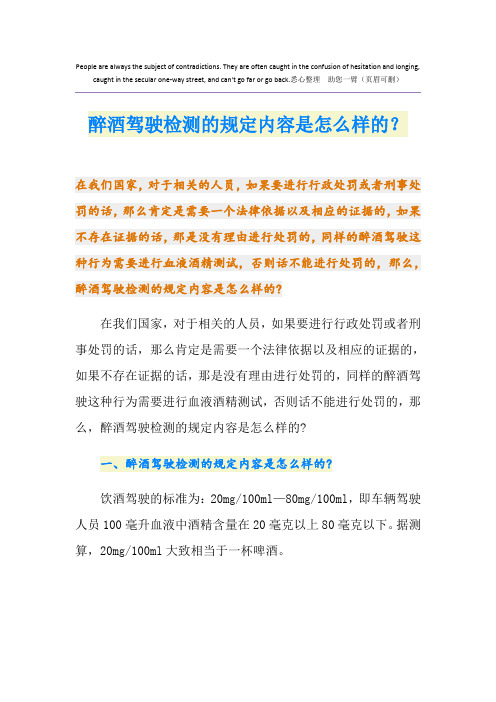
People are always the subject of contradictions. They are often caught in the confusion of hesitation and longing, caught in the secular one-way street, and can't go far or go back.悉心整理助您一臂(页眉可删)醉酒驾驶检测的规定内容是怎么样的?在我们国家,对于相关的人员,如果要进行行政处罚或者刑事处罚的话,那么肯定是需要一个法律依据以及相应的证据的,如果不存在证据的话,那是没有理由进行处罚的,同样的醉酒驾驶这种行为需要进行血液酒精测试,否则话不能进行处罚的,那么,醉酒驾驶检测的规定内容是怎么样的?在我们国家,对于相关的人员,如果要进行行政处罚或者刑事处罚的话,那么肯定是需要一个法律依据以及相应的证据的,如果不存在证据的话,那是没有理由进行处罚的,同样的醉酒驾驶这种行为需要进行血液酒精测试,否则话不能进行处罚的,那么,醉酒驾驶检测的规定内容是怎么样的?一、醉酒驾驶检测的规定内容是怎么样的?饮酒驾驶的标准为:20mg/100ml—80mg/100ml,即车辆驾驶人员100毫升血液中酒精含量在20毫克以上80毫克以下。
据测算,20mg/100ml大致相当于一杯啤酒。
醉酒驾驶的标准为:等于或大于80mg/100ml,即车辆驾驶人员100毫升血液中酒精含量在80毫克以上。
据测算,80mg/100ml则相当于3两低度白酒或者2瓶啤酒。
100mg/100ml,大致相当于半斤低度白酒或者3瓶啤酒。
落实到具体的白酒酒精度数,如果人体中每百毫升血液中含到100毫克酒精,不同的酒类的量化分别是:70度白酒约50克;60度白酒约75克;50度白酒约100克;40度白酒约150克,也就是一口杯的量;日本清酒约500克;红酒约600克;啤酒约3瓶或者6个易拉罐。
禁止酒水英文作文
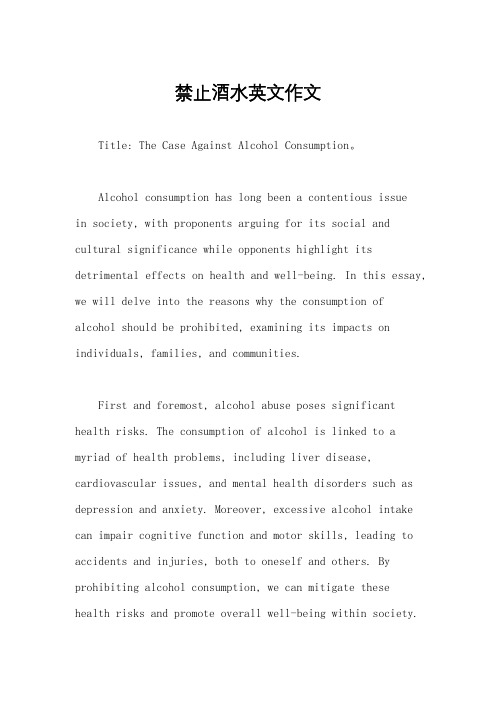
禁止酒水英文作文Title: The Case Against Alcohol Consumption。
Alcohol consumption has long been a contentious issuein society, with proponents arguing for its social and cultural significance while opponents highlight its detrimental effects on health and well-being. In this essay, we will delve into the reasons why the consumption ofalcohol should be prohibited, examining its impacts on individuals, families, and communities.First and foremost, alcohol abuse poses significant health risks. The consumption of alcohol is linked to a myriad of health problems, including liver disease, cardiovascular issues, and mental health disorders such as depression and anxiety. Moreover, excessive alcohol intake can impair cognitive function and motor skills, leading to accidents and injuries, both to oneself and others. By prohibiting alcohol consumption, we can mitigate thesehealth risks and promote overall well-being within society.Furthermore, alcohol abuse has devastating consequences for families and relationships. It often leads to domestic violence, neglect of children, and strained interpersonal dynamics. The effects of alcohol abuse ripple through generations, perpetuating cycles of dysfunction and trauma. By banning alcohol consumption, we can protect familiesfrom the destructive impact of addiction and create safer, more nurturing environments for children to grow and thrive.In addition to its effects on individuals and families, alcohol abuse also takes a toll on communities as a whole. Excessive drinking contributes to crime, including assault, vandalism, and drunk driving incidents. It places a burden on law enforcement agencies and emergency medical services, diverting resources away from other pressing issues. Moreover, alcohol-related harm disproportionately affects marginalized communities, exacerbating existing disparities and inequalities. By prohibiting alcohol consumption, wecan alleviate the social and economic burdens associatedwith alcohol abuse and foster healthier, more cohesive communities.Critics of alcohol prohibition may argue that it infringes upon personal freedom and choice. However, it is important to recognize that the harms of alcohol abuse extend far beyond individual autonomy. The negative externalities of alcohol consumption impact society as a whole, necessitating collective action to address this public health crisis. Just as we regulate other substances and behaviors that pose risks to public safety, such as tobacco use and speeding on roads, we have a responsibility to regulate alcohol consumption in the interest of promoting the common good.Moreover, prohibition does not mean the complete eradication of alcohol from society. Rather, it involves implementing policies and regulations to restrict access to alcohol and deter excessive consumption. This may include measures such as raising the legal drinking age, imposing higher taxes on alcoholic beverages, and implementing stricter penalties for alcohol-related offenses. By adopting a comprehensive approach to alcohol control, we can reduce the harms associated with its consumption whilestill allowing for moderate and responsible use by adults.In conclusion, the prohibition of alcohol consumption is a necessary step towards promoting public health, safeguarding families and communities, and addressing the societal harms of alcohol abuse. By enacting policies to restrict access to alcohol and discourage excessive consumption, we can create a safer, healthier, and more equitable society for all. It is time to prioritize the well-being of individuals and communities over the interests of the alcohol industry.。
预防酒精成瘾 英语作文
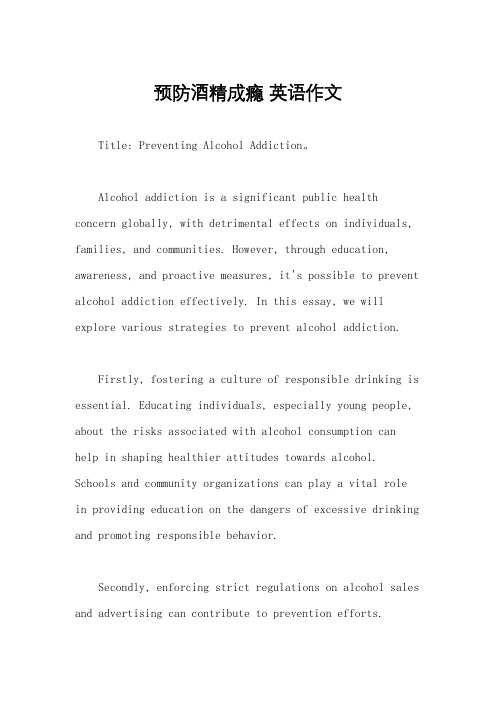
预防酒精成瘾英语作文Title: Preventing Alcohol Addiction。
Alcohol addiction is a significant public health concern globally, with detrimental effects on individuals, families, and communities. However, through education, awareness, and proactive measures, it's possible to prevent alcohol addiction effectively. In this essay, we will explore various strategies to prevent alcohol addiction.Firstly, fostering a culture of responsible drinking is essential. Educating individuals, especially young people, about the risks associated with alcohol consumption can help in shaping healthier attitudes towards alcohol. Schools and community organizations can play a vital rolein providing education on the dangers of excessive drinking and promoting responsible behavior.Secondly, enforcing strict regulations on alcohol sales and advertising can contribute to prevention efforts.Limiting the availability of alcohol, particularly to underage individuals, can reduce the likelihood of early experimentation and subsequent addiction. Additionally, restricting alcohol advertising, especially in areas where young people are exposed, can minimize the glamorization of alcohol consumption.Furthermore, providing access to support and resources for individuals at risk of alcohol addiction is crucial. Counseling services, support groups, and helplines canoffer assistance to those struggling with alcohol abuse or dependency. By offering accessible and non-judgmental support, individuals are more likely to seek help and address their alcohol-related issues.Moreover, promoting alternative recreational activities and hobbies can divert attention away from alcohol consumption. Encouraging participation in sports, arts, and community events provides healthy outlets for socializing and relaxation, reducing the reliance on alcohol for entertainment.Additionally, addressing underlying mental health issues and stress management is essential in preventing alcohol addiction. Many individuals turn to alcohol as a coping mechanism for stress, anxiety, or depression. By promoting mental wellness initiatives and providing access to counseling and therapy services, individuals can learn healthier ways to manage their emotions and reduce the risk of turning to alcohol.Furthermore, involving families and communities in prevention efforts can create a supportive environment for individuals at risk. Open communication within families about the dangers of alcohol, along with providing support and encouragement, can help prevent alcohol addiction among family members. Community-based initiatives, such as neighborhood watch programs and local awareness campaigns, can also foster a sense of responsibility and solidarity in preventing alcohol abuse.In conclusion, preventing alcohol addiction requires a multi-faceted approach that addresses social, cultural, and individual factors. By promoting responsible drinking,enforcing regulations, providing support services, promoting alternative activities, addressing mental health issues, and involving families and communities, we can effectively reduce the prevalence of alcohol addiction. Through concerted efforts and collaboration, we can create a healthier and safer environment for everyone.。
写一篇酒精非酒精分类英语作文
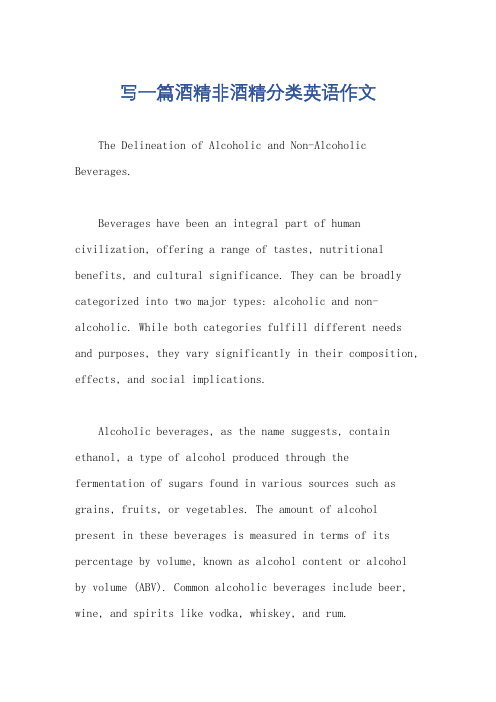
写一篇酒精非酒精分类英语作文The Delineation of Alcoholic and Non-Alcoholic Beverages.Beverages have been an integral part of human civilization, offering a range of tastes, nutritional benefits, and cultural significance. They can be broadly categorized into two major types: alcoholic and non-alcoholic. While both categories fulfill different needs and purposes, they vary significantly in their composition, effects, and social implications.Alcoholic beverages, as the name suggests, contain ethanol, a type of alcohol produced through the fermentation of sugars found in various sources such as grains, fruits, or vegetables. The amount of alcohol present in these beverages is measured in terms of its percentage by volume, known as alcohol content or alcohol by volume (ABV). Common alcoholic beverages include beer, wine, and spirits like vodka, whiskey, and rum.Beer, the most widely consumed alcoholic beverage globally, is produced by the fermentation of grains, primarily barley, with hops added for flavor and preservative properties. Its alcohol content typically ranges from 3% to 10% ABV. Wine, on the other hand, is made from the fermentation of grapes and has an alcohol content of around 12% to 15% ABV. Spirits, which are typically distilled beverages, have the highest alcohol content, varying from 40% to over 60% ABV.The consumption of alcoholic beverages has been associated with a range of effects on the human body and mind. In moderation, alcohol can act as a social lubricant, facilitating relaxation and bonding among individuals. However, excessive consumption can lead to various health problems, including liver disease, cardiovascular issues, and even cancer. Furthermore, alcohol impairment can affect cognitive functions, leading to decreased inhibitions and increased risk-taking behaviors.Non-alcoholic beverages, by contrast, do not containethanol or have a negligible amount of alcohol. These beverages are diverse and include a wide range of options, such as tea, coffee, soft drinks, juices, sports drinks,and water.Tea and coffee are two of the most popular non-alcoholic beverages globally, known for their stimulatory effects. Tea, derived from the leaves of the Camellia sinensis plant, is rich in antioxidants and has been associated with various health benefits, including improved heart health and reduced risk of certain cancers. Coffee,on the other hand, is made from the seeds of the Coffea species and is known for its caffeine content, which actsas a stimulant, enhancing alertness and cognitive performance.Soft drinks, also known as non-alcoholic beverages, are sweetened beverages that do not contain significant amounts of alcohol. These beverages are popular among children and adults alike, offering a refreshing alternative toalcoholic drinks. However, excessive consumption of sugary soft drinks can lead to weight gain and other health issues.Juices and sports drinks are other examples of non-alcoholic beverages that serve specific nutritional needs. Juices are extracted from fruits or vegetables and providea concentrated source of vitamins, minerals, and antioxidants. Sports drinks, on the other hand, aredesigned to replace electrolytes and carbohydrates lost during physical activity and are typically rich in carbohydrates and electrolytes.Water, the most essential non-alcoholic beverage, is crucial for maintaining life. It is involved in almostevery bodily function, from digestion to circulation. Dehydration, caused by inadequate water intake, can lead to various health problems, including fatigue, dizziness, and even kidney stones.In terms of social implications, non-alcoholic beverages are often considered more suitable for day-to-day consumption, particularly in workplaces and other professional settings. They are also associated with a healthier lifestyle, promoting hydration, weight management,and overall well-being.In conclusion, alcoholic and non-alcoholic beverages differ significantly in their composition, effects, and social implications. Both categories have their unique place in human culture and society, fulfilling different needs and purposes. It is essential to understand these differences and consume beverages responsibly, taking into account personal health, lifestyle, and social context.。
建议不喝酒的英语作文
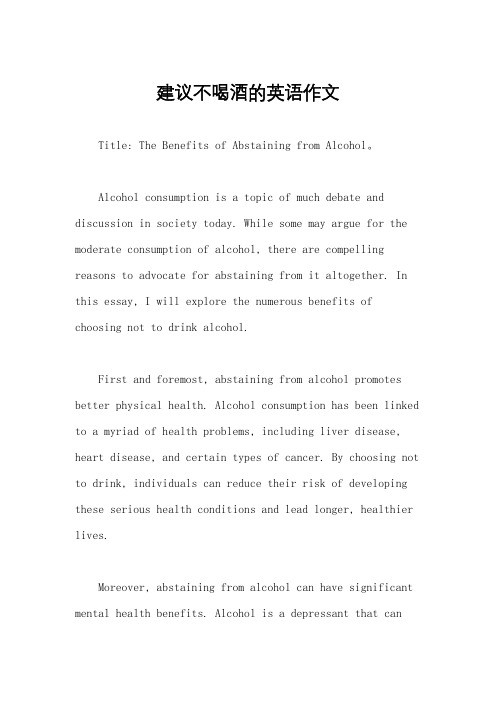
建议不喝酒的英语作文Title: The Benefits of Abstaining from Alcohol。
Alcohol consumption is a topic of much debate and discussion in society today. While some may argue for the moderate consumption of alcohol, there are compelling reasons to advocate for abstaining from it altogether. In this essay, I will explore the numerous benefits of choosing not to drink alcohol.First and foremost, abstaining from alcohol promotes better physical health. Alcohol consumption has been linked to a myriad of health problems, including liver disease, heart disease, and certain types of cancer. By choosing not to drink, individuals can reduce their risk of developing these serious health conditions and lead longer, healthier lives.Moreover, abstaining from alcohol can have significant mental health benefits. Alcohol is a depressant that canexacerbate symptoms of anxiety and depression. While some individuals may turn to alcohol as a means of coping with stress or negative emotions, it often serves as a temporary escape rather than a long-term solution. By abstaining from alcohol, individuals can develop healthier coping mechanisms and address the root causes of their mental health issues.In addition to the physical and mental health benefits, abstaining from alcohol can also lead to improved relationships and social interactions. Alcohol consumption is often associated with reckless behavior and impaired judgment, which can strain relationships and lead to conflicts with loved ones. By choosing not to drink, individuals can avoid these negative consequences andfoster stronger, more meaningful connections with others.Furthermore, abstaining from alcohol can have positive effects on one's productivity and overall quality of life. Alcohol consumption can impair cognitive function and reduce productivity, making it difficult to focus on tasks and achieve goals. By abstaining from alcohol, individualscan maintain sharp mental clarity and perform at their best in both personal and professional pursuits.Another important consideration is the financial aspect of abstaining from alcohol. Drinking can be an expensive habit, especially for those who frequent bars or purchase alcohol regularly. By abstaining from alcohol, individuals can save a significant amount of money that can be put towards more meaningful pursuits, such as travel, education, or hobbies.Finally, abstaining from alcohol sets a positive example for others, especially younger generations. By demonstrating that it is possible to have fun and socialize without alcohol, individuals can inspire others to make healthier choices and resist peer pressure to drink. This ripple effect can contribute to a culture of moderation and responsibility surrounding alcohol consumption.In conclusion, there are numerous benefits toabstaining from alcohol, including improved physical and mental health, stronger relationships, increasedproductivity, financial savings, and setting a positive example for others. While the decision to abstain from alcohol may not be easy, the long-term rewards far outweigh any temporary pleasures that alcohol may provide. By choosing not to drink, individuals can lead happier, healthier, and more fulfilling lives.。
酒精饮料的进出口政策与国际贸易实务考核试卷

B.数量
C.成分
D.付款方式
5.以下哪个国家的葡萄酒进口关税最高?()
A.美国
B.欧盟
C.日本
D.印度
6.以下哪个国际协定旨在降低成员国之间的酒精饮料关税?()
A. NAFTA
B. ASEAN
C. EU
D. TPP
7.在国际贸易中,以下哪种运输方式最不适合运输酒精饮料?()
A.铁路
B.公路
4.信用证支付方式可以完全避免国际贸易中的信用风险。()
5.欧盟内部对于酒精饮料的贸易没有关税壁垒。()
6.在国际贸易中,酒精饮料的包装上可以不标明生产日期。()
7.产地证明对于酒精饮料的出口非常重要,因为不同国家的关税不同。()
8.酒精饮料的广告在所有国家都受到相同的法规限制。()
9.在国际贸易中,DDP术语下买方需要承担所有运输和进口相关的费用和风险。()
A.温度
B.湿度
C.震动
D.光照
12.以下哪些国家被认为是啤酒的主要消费国?()
A.中国
B.美国
C.巴西
D.德国
13.在国际贸易中,以下哪些术语表示买方承担货物运输到指定地点的费用和风险?()
A. EXW
B. FCA
C. CPT
D. DAP
14.以下哪些类型的酒精饮料在穆斯林国家可能受到限制或禁止?()
A.中国
B.日本
C.韩国
D.越南
18.在国际贸易中,以下哪个术语表示买方需要承担货物运输至目的港的费用和风险?()
A. FCA
B. DAT
C. DDP
D. CIP
19.以下哪个国家拥有世界上最严格的酒精饮料广告法规?()
alcohol consumption by country -回复

alcohol consumption by country -回复什么是国家的饮酒文化?人们在不同国家和地区会以多么不同的方式消费酒精饮料?饮酒对一个国家的影响是什么?本文将探讨世界各国的饮酒习惯及其对社会、经济和健康的影响。
饮酒文化是一个国家或地区在社会、经济和历史因素的影响下形成的一种饮酒传统和行为模式。
饮酒文化的形成与地理、气候、宗教、社会制度、经济状况以及历史和文化因素等有着紧密的联系。
因此,不同国家和地区的饮酒文化存在巨大的差异。
首先,我们来看一些国家和地区饮酒的法律和规定。
有些国家对饮酒有严格的法律和规定,如英国、德国和俄罗斯等。
这些国家对酒精饮料进行管控,比如限制饮酒的年龄,规定饮酒场所和时间等。
然而,也有些国家相对较宽松,对酒精饮料的消费没有过多限制,如法国、西班牙和意大利等,甚至一些国家将酒精饮料视为文化传统的一部分。
其次,各国饮酒文化的差异主要表现在饮酒场合、饮酒方式和饮用酒种类方面。
在英国和爱尔兰等国家,人们常常在酒吧里和朋友们一起喝酒,尤其是在周末的晚上。
而在意大利和西班牙,人们更喜欢在用餐时品尝红酒,以提高食欲和享受美食。
此外,各国选择的酒精饮料也不尽相同,如英国人喜欢喝啤酒,法国人喜欢红酒,俄罗斯人喜欢伏特加,各国的饮酒偏好因地域和文化的不同而异。
饮酒文化对国家和社会有着深远的影响。
首先,饮酒对经济的贡献不可忽视。
许多国家将酿酒业作为重要的经济支柱产业,通过酿造和销售酒精饮品创造了大量的就业机会,并为国家贡献了不菲的税收收入。
此外,酒店、餐饮业、旅游业等相关产业也受益于饮酒文化的繁荣。
其次,饮酒对社会和文化有着深远的影响。
例如,英国的酒吧文化已经成为当地社交和娱乐生活的重要组成部分,它不仅提供了与朋友聚会的场所,还承载了当地社区的文化传承和历史记忆。
相比之下,法国的酒庄和意大利的葡萄酒产区成为了当地独特的文化景点和旅游胜地,吸引了大批国内外游客品尝当地的美食和美酒。
小包装的鲜葡萄酿造的酒(小包装指装入…(HS 220421)2017 哈萨克斯
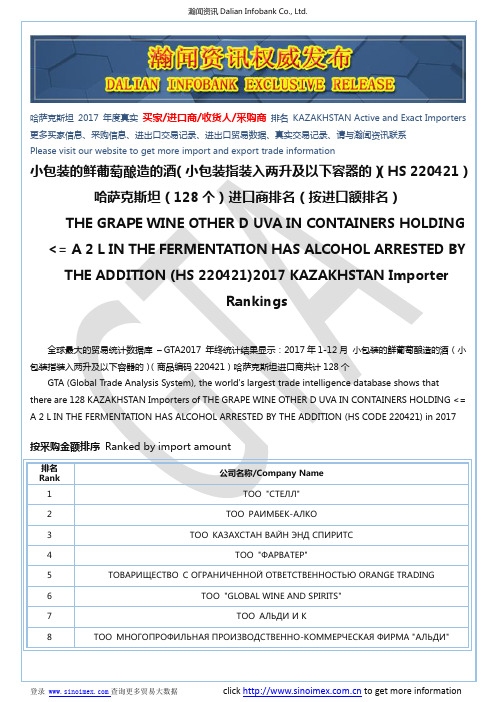
登录 查询更多re information
瀚闻资讯 Dalian Infobank Co., Ltd.
9 10 11 12 13 14 15 16 17 18 19 20 21 22 23 24 25 26 27 28 29 30 31 32 33 34 35 36 37 38 39
ТОО КАМ ПИТ ТОВАРИЩ ЕСТВО С ОГРАНИЧЕННОЙ ОТВЕТСТВЕННОСТЬЮ "ALCOMARKET.KZ" ТОО "VILED GROUP" (ВИЛЕД ГРУПП ) ТОВАРИЩ ЕСТВО С ОГРАНИЧЕННОЙ ОТВЕТСТВЕННОСТЬЮ "КАЗАХСТАНСКАЯ ПИВНАЯ КОМ ПАНИ Я" ТОВАРИЩ ЕСТВО С ОГРАНИЧЕННОЙ ОТВЕТСТВЕННОСТЬЮ "GLOBAL WINE DISTRIBUTION" (ГЛОБАЛ ВАЙ Н ДИСТРИБЬЮШ Н ) ТОВАРИЩ ЕСТВО С ОГРАНИЧЕННОЙ ОТВЕТСТВЕННОСТЬЮ "ТЕРРИТОРИЯ ВИНА " ТОО "VELES SPIRITS" ТОО БРИГ ТОО "MONTEBIANCO" ТОО ТАЛПЫН ЛТД ТОО "АЗАМ АТ" ТОВАРИЩ ЕСТВО С ОГРАНИЧЕННОЙ ОТВЕТСТВЕННОСТЬЮ "AIE LOGISTICS" ТОО ОРИЕНТ ИГЛ ДЮТИ ФРИ ТОВАРИЩ ЕСТВО С ОГРАНИЧЕННОЙ ОТВЕТСТВЕННОСТЬЮ КАЗАХСТАНСКО -ГРУЗИНСКОЕ СОВМ ЕСТНОЕ ПРЕДПРИ ЯТИЕ КВАРТА ГРУПП ТОО КАЗАХСТАНСКАЯ ПИВНАЯ КОМ ПАНИ Я ТОВАРИЩ ЕСТВО С ОГРАНИЧЕННОЙ ОТВЕТСТВЕННОСТЬЮ "GRAND COMMERCE GROUP" ТОО "BOS FOOD" ТОО "SAB IMPORT" ТОО КОМ ПАНИ Я ГЛАВВИНОПРОДУКТ ЛТД ТОО LA BOLLINA KZ ТОО "SAB TRADE COMPANY" ТОО "М ЕТРО КЭШ ЭНД КЕРРИ " ТОО "ARLINE" ТОВАРИЩ ЕСТВО С ОГРАНИЧЕННОЙ ОТВЕТСТВЕННОСТЬЮ "ECO TRADE.KZ" ТОО "GRAND VIN" (ГРАНД ВИН ) ТОО VLD-ALKO ТОО ФАРВАТЕР ТОО PRIVATE DISTRIBUTION (ПРИВАТ ДИСТРИБЬЮШ ЕН ) ТОВАРИЩ ЕСТВО С ОГРАНИЧЕННОЙ ОТВЕСТВЕННОСТЬЮ "ARDIS ALMATY" ТОВАРИЩ ЕСТВО С ОГРАНИЧЕННОЙ ОТВЕТСТВЕННОСТЬЮ DUMAN ТОО ARLINE
如何摆脱酗酒成瘾
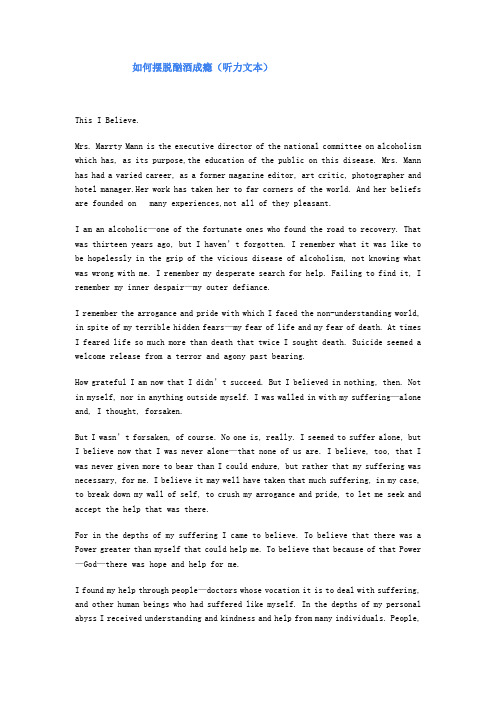
如何摆脱酗酒成瘾(听力文本)This I Believe.Mrs. Marrty Mann is the executive director of the national committee on alcoholism which has, as its purpose,the education of the public on this disease. Mrs. Mann has had a varied career, as a former magazine editor, art critic, photographer and hotel manager.Her work has taken her to far corners of the world. And her beliefs are founded on many experiences,not all of they pleasant.I am an alcoholic—one of the fortunate ones who found the road to recovery. That was thirteen years ago, but I haven’t forgotten. I remember what it was like to be hopelessly in the grip of the vicious disease of alcoholism, not knowing what was wrong with me. I remember my desperate search for help. Failing to find it, I remember my inner despair—my outer defiance.I remember the arrogance and pride with which I faced the non-understanding world, in spite of my terrible hidden fears—my fear of life and my fear of death. At times I feared life so much more than death that twice I sought death. Suicide seemed a welcome release from a terror and agony past bearing.How grateful I am now that I didn’t succeed. But I believed in nothing, then. Not in myself, nor in anything outside myself. I was walled in with my suffering—alone and, I thought, forsaken.But I wasn’t forsaken, of course. No one is, really. I seemed to suffer alone, but I believe now that I was never alone—that none of us are. I believe, too, that I was never given more to bear than I could endure, but rather that my suffering was necessary, for me. I believe it may well have taken that much suffering, in my case, to break down my wall of self, to crush my arrogance and pride, to let me seek and accept the help that was there.For in the depths of my suffering I came to believe. To believe that there was a Power greater than myself that could help me. To believe that because of that Power —God—there was hope and help for me.I found my help through people—doctors whose vocation it is to deal with suffering, and other human beings who had suffered like myself. In the depths of my personal abyss I received understanding and kindness and help from many individuals. People,I learned, can be very kind. I came to believe deeply in this—in people and the good that is in them.I came to realize that suffering is universal. It lies behind much apparent harshness and irritability, many of the careless, even cruel, words and acts which make our daily lives difficult so much of the time. I learned that if I could understand this, I might not react so often with anger or hurt. And if I learned to react to difficult behavior with understanding and sympathy, I might help to bring about a change in that behavior. My suffering helped me to know things.I do not believe that everyone should suffer. But I do believe that suffering can be good, and even necessary, if—and only if—one learns to accept that suffering as part of one’s essential learning process, and then to use it to help oneself and one’s fellow sufferers.Don’t we all endure suffering, one way or another? This fact gives me a deep sense of kinship with other people and a consequent desire to help others in any and every way I can.It is this belief that underlies my work, for alcoholism is the area in which I feel best fitted, through my own experience, to help others. And I believe that trying to help my fellow men is one of the straightest roads to spiritual growth. It is a road everyone can take. One doesn’t have to be beautiful or gifted, or rich or powerful, in order to offer a helping hand to one’s fellow sufferers. And I believe that one can walk with God by doing just that.That was Mrs. Matty Mann, founder and executive director of the national committee on alcoholism.。
欧盟有机葡萄酒法规翻译
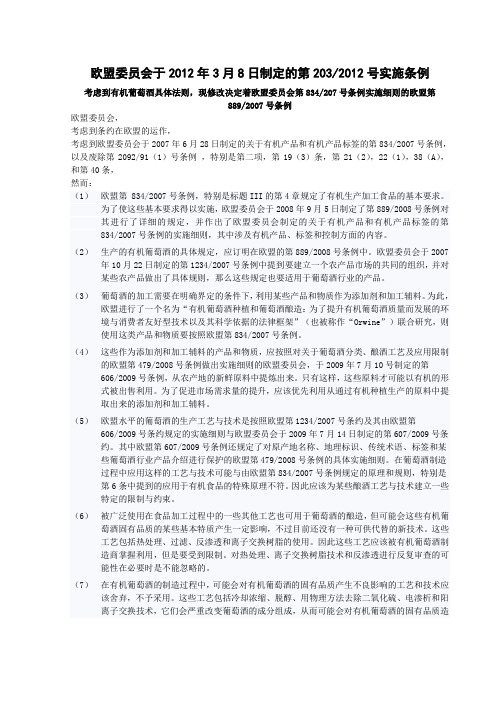
欧盟委员会于2012年3月8日制定的第203/2012号实施条例考虑到有机葡萄酒具体法则,现修改决定着欧盟委员会第834/207号条例实施细则的欧盟第889/2007号条例欧盟委员会,考虑到条约在欧盟的运作,考虑到欧盟委员会于2007年6月28日制定的关于有机产品和有机产品标签的第834/2007号条例,以及废除第2092/91(1)号条例,特别是第二项,第19(3)条,第21(2),22(1),38(A),和第40条,然而:(1)欧盟第 834/2007号条例,特别是标题III的第4章规定了有机生产加工食品的基本要求。
为了使这些基本要求得以实施,欧盟委员会于2008年9月5日制定了第889/2008号条例对其进行了详细的规定,并作出了欧盟委员会制定的关于有机产品和有机产品标签的第834/2007号条例的实施细则,其中涉及有机产品、标签和控制方面的内容。
(2)生产的有机葡萄酒的具体规定,应订明在欧盟的第889/2008号条例中。
欧盟委员会于2007年10月22日制定的第1234/2007号条例中提到要建立一个农产品市场的共同的组织,并对某些农产品做出了具体规则,那么这些规定也要适用于葡萄酒行业的产品。
(3)葡萄酒的加工需要在明确界定的条件下,利用某些产品和物质作为添加剂和加工辅料。
为此,欧盟进行了一个名为“有机葡萄酒种植和葡萄酒酿造:为了提升有机葡萄酒质量而发展的环境与消费者友好型技术以及其科学依据的法律框架”(也被称作“Orwine”)联合研究,则使用这类产品和物质要按照欧盟第834/2007号条例。
(4)这些作为添加剂和加工辅料的产品和物质,应按照对关于葡萄酒分类、酿酒工艺及应用限制的欧盟第479/2008号条例做出实施细则的欧盟委员会,于2009年7月10号制定的第606/2009号条例,从农产地的新鲜原料中提炼出来。
只有这样,这些原料才可能以有机的形式被出售利用。
为了促进市场需求量的提升,应该优先利用从通过有机种植生产的原料中提取出来的添加剂和加工辅料。
葡萄酒二级考试题库答案
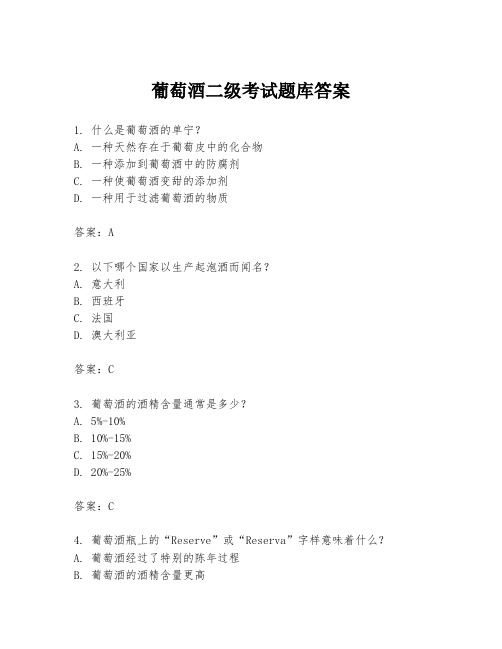
葡萄酒二级考试题库答案1. 什么是葡萄酒的单宁?A. 一种天然存在于葡萄皮中的化合物B. 一种添加到葡萄酒中的防腐剂C. 一种使葡萄酒变甜的添加剂D. 一种用于过滤葡萄酒的物质答案:A2. 以下哪个国家以生产起泡酒而闻名?A. 意大利B. 西班牙C. 法国D. 澳大利亚答案:C3. 葡萄酒的酒精含量通常是多少?A. 5%-10%B. 10%-15%C. 15%-20%D. 20%-25%答案:C4. 葡萄酒瓶上的“Reserve”或“Reserva”字样意味着什么?A. 葡萄酒经过了特别的陈年过程B. 葡萄酒的酒精含量更高C. 葡萄酒使用了特殊的葡萄品种D. 葡萄酒的容量更大答案:A5. 以下哪种葡萄品种通常用于生产白葡萄酒?A. 赤霞珠B. 黑皮诺C. 长相思D. 西拉答案:C6. 葡萄酒的“酒脚”或“泪滴”是什么?A. 葡萄酒中的气泡B. 葡萄酒表面的油脂C. 葡萄酒在杯壁上留下的液体痕迹D. 葡萄酒中的沉淀物答案:C7. 以下哪个术语描述的是葡萄酒的酸度?A. 单宁B. 酒精度C. 酸度D. 甜度答案:C8. 葡萄酒的“陈年”是什么意思?A. 葡萄酒在瓶中存放的时间B. 葡萄酒在橡木桶中存放的时间C. 葡萄酒在葡萄园中成熟的时间D. 葡萄酒在生产过程中的时间答案:B9. 以下哪个国家不是新世界葡萄酒生产国?A. 智利B. 阿根廷C. 南非D. 意大利答案:D10. 葡萄酒的“平衡”是什么意思?A. 葡萄酒的酒精度和甜度相等B. 葡萄酒的酸度和单宁相等C. 葡萄酒的各种风味特征相互协调D. 葡萄酒的酒精度和酸度相等答案:C结束语:以上是葡萄酒二级考试题库的部分答案,希望对您的学习和考试有所帮助。
WSET1级 考试试题及答案

WSET一级模拟题(一)(只有一个最正确的选择项,有的选择项可能50%正确,有的可能是80%正确,选80%的这个作为正确答案。
排除法往往是很有效率的。
)1:香槟酒适宜的饮用温度A:6度B:25度C:18度D:12度2:哪个国家不属于旧世界?A:德国:B:葡萄牙C:法国D:阿根廷3:红葡萄品种是否可以酿造白葡萄酒?A:是B:否4:红葡萄酒越老颜色越深?A:是B:否5:法国有()大葡萄酒产区?A:5B:8C:9D:106:香槟是什么?A:起泡葡萄酒B:一种水果C:静止葡萄酒D:加强型葡萄酒7:红葡萄酒的酿造过程是:A:破皮-发酵-压榨-熟成B:破皮-压榨-发酵-熟成C:破皮-发酵-加白兰地-熟成D:破皮-发酵-瓶中二次发酵-熟成8:葡萄酒发酵原理是酵母和什么成分发生反应?A:单宁B:果酸C:糖分D:二氧化碳9:下列哪个不是红葡萄品种?A:赤霞珠B:西哈C:长相思D:美乐10:法国葡萄酒的最高等级是:A:Vin de PaysB:AOCC:Vine de Table D:VDQS11:适合葡萄酒长期储存的温度A:18度B:20度C:12度D:6度12:以下哪个葡萄品种是勃艮第地区的?A:赤霞珠B:美乐C:黑皮诺D:长相思13:单宁在口中是什么感觉?A:甜B:收敛的感觉C:酸D:灼热14:以下哪项描述是把葡萄酒按照糖分含量分类的A:干型B:重酒体C:静止葡萄酒D:桃红葡萄酒15:下列哪项能最大限度的醒酒?A:摇晃葡萄酒B:冰镇葡萄酒C:加热葡萄酒D:将葡萄酒倒入另一个容器16:下列哪个杯子比较适合琼瑶浆?A:白葡萄酒杯B:波尔多杯C:勃艮地杯D:香槟杯17:哪个国家的酿酒历史最悠久?A:美国B:意大利C:法国D:澳大利亚18:进口葡萄酒为什么有中文标签?A:中国的法律规定B:在中国灌装的葡萄酒C:假酒D:好识别19:“青草”味道最有可能在什么酒中出现?A:雷司令B:长相思C:西哈D:霞多丽20:下列哪个最有可能不是甜酒?A:贵腐酒B:冰酒C:波特酒D:霞多丽21:容积75cl的葡萄酒能倒出多少杯125mlA:6B:3C:4D:522:如果海鲜和重酒体,高单宁的红葡萄酒搭配会怎样?A:产生金属的味道B:不会有什么变化C:海鲜变鲜D:酒变苦23:高单宁的酒适合和什么食物搭配?A:鸡肉B:鸭肉C:鱼D:牛肉24:葡萄酒中的什么成分会让你分泌唾液?A:色素B:单宁C:酸D:糖25:下列哪项不是起泡酒?A:阿斯体ASTIB:卡瓦CAVA C:香槟Champagne D:雪利酒Sherry答案:1-5:ADABD 6-10:AACCB 11-15:CCBAD 16-20:ABABD 21-25:AADCDWSET一级模拟题(二)(只有一个最正确的选择项,有的选择项可能50%正确,有的可能是80%正确,选80%的这个作为正确答案。
酒精中毒翻译
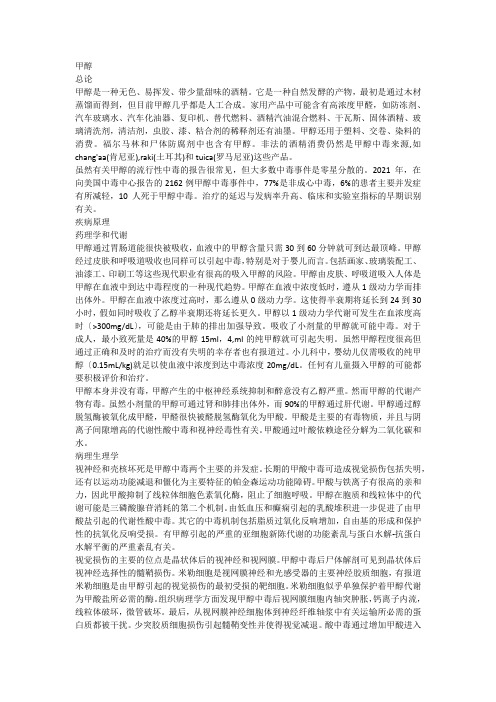
甲醇总论甲醇是一种无色、易挥发、带少量甜味的酒精。
它是一种自然发酵的产物,最初是通过木材蒸馏而得到,但目前甲醇几乎都是人工合成。
家用产品中可能含有高浓度甲醛,如防冻剂、汽车玻璃水、汽车化油器、复印机、替代燃料、酒精汽油混合燃料、干瓦斯、固体酒精、玻璃清洗剂,清洁剂,虫胶、漆、粘合剂的稀释剂还有油墨。
甲醇还用于塑料、交卷、染料的消费。
福尔马林和尸体防腐剂中也含有甲醇。
非法的酒精消费仍然是甲醇中毒来源,如chang'aa(肯尼亚),raki(土耳其)和tuica(罗马尼亚)这些产品。
虽然有关甲醇的流行性中毒的报告很常见,但大多数中毒事件是零星分散的。
2021年,在向美国中毒中心报告的2162例甲醇中毒事件中,77%是非成心中毒,6%的患者主要并发症有所减轻,10人死于甲醇中毒。
治疗的延迟与发病率升高、临床和实验室指标的早期识别有关。
疾病原理药理学和代谢甲醇通过胃肠道能很快被吸收,血液中的甲醇含量只需30到60分钟就可到达最顶峰。
甲醇经过皮肤和呼吸道吸收也同样可以引起中毒,特别是对于婴儿而言。
包括画家、玻璃装配工、油漆工、印刷工等这些现代职业有很高的吸入甲醇的风险。
甲醇由皮肤、呼吸道吸入人体是甲醇在血液中到达中毒程度的一种现代趋势。
甲醇在血液中浓度低时,遵从1级动力学而排出体外。
甲醇在血液中浓度过高时,那么遵从0级动力学。
这使得半衰期将延长到24到30小时,假如同时吸收了乙醇半衰期还将延长更久。
甲醇以1级动力学代谢可发生在血浓度高时〔>300mg/dL〕,可能是由于肺的排出加强导致。
吸收了小剂量的甲醇就可能中毒。
对于成人,最小致死量是40%的甲醇15ml,4,ml的纯甲醇就可引起失明。
虽然甲醇程度很高但通过正确和及时的治疗而没有失明的幸存者也有报道过。
小儿科中,婴幼儿仅需吸收的纯甲醇〔0.15mL/kg)就足以使血液中浓度到达中毒浓度20mg/dL。
任何有儿童摄入甲醇的可能都要积极评价和治疗。
- 1、下载文档前请自行甄别文档内容的完整性,平台不提供额外的编辑、内容补充、找答案等附加服务。
- 2、"仅部分预览"的文档,不可在线预览部分如存在完整性等问题,可反馈申请退款(可完整预览的文档不适用该条件!)。
- 3、如文档侵犯您的权益,请联系客服反馈,我们会尽快为您处理(人工客服工作时间:9:00-18:30)。
Unofficial translationMinistry of Social Affairs and Health, FinlandN.B. Legally valid only in Finnish and SwedishNo. 1143/1994THE ALCOHOL ACTIssued in Helsinki on 8 December 19941 ChapterprovisionsGeneral1 SectionPurpose of the ActThe purpose of this Act is to prevent detrimental societal, social and health effects caused by alcoholic substances by controlling the consumption of alcohol.2 SectionApplication of the ActThis Act applies to alcoholic substances, their production, importation, exportation, sale and other delivery, use, possession and transport, as well as to advertising alcoholic beverages.In regard to alcoholic substances which are medicines or pharmaceutical preparations specific provisions are enacted.Section 3 (4.1.2001/1)DefinitionsFor the purposes of this Actalcoholic substance means a substance or product which contains more than 2.8 1)percentage by volume ethyl alcohol;denaturation means treatment of an alcoholic substance by adding to it other2)substances in order to make the substance unfit to be drunk;non-alcoholic beverage means a beverage which contains a maximum of 2.83)percentage by volume ethyl alcohol; andState Alcohol Monopoly means a limited company (Alko Ltd.) wholly owned by 4)the State whose task is to carry on the retail trade stipulated in this Act to be its sole right.Alcoholic substances referred to in paragraph 1(1), include alcoholic beverages, alcoholic preparations and spirits. For the purposes of this Actalcoholic beverage means a beverage which contains a maximum of 801)percentage by volume ethyl alcohol;mild alcoholic beverage means an alcoholic beverage which contains a maximum 2)of 22 percentage by volume ethyl alcohol;3)strong alcoholic beverage means an alcoholic beverage which contains more than 22 percentage by volume ethyl alcohol;4)spirits means ethyl alcohol or an aqueous solution of ethyl alcohol where the proportion of ethyl alcohol exceeds 80 percentage by volume and which is not denatured; andalcoholic preparation means an alcoholic substance which is not an alcoholic5)beverage or spirit and which can be denatured.Concerning definitions of alcoholic beverages laid down in paragraph 2, as well as other definitions, description and presentation of alcoholic beverages, raw material and additives, and maximum contents of contaminants harmful to health, provisions are laid down by Government Decree.Concerning alcoholic preparations, their production, importation, exportation, sale and control and concerning denaturation more detailed provisions are laid down by Government Decree.2 ChapterProduction of alcoholic beverages and spirits4 SectionMaking alcoholic beverages at homeIt is allowable, according to what is provided by Decree, to prepare in the household for private use mild alcoholic beverages exclusively through fermentation for purposes other than sale.5 Section Licence to produce alcoholic beverages and spiritsAlcoholic beverages and spirits may be produced for business activity or, in the manner as will be prescribed in greater detail by the Ministry of Social Affairs and Health, for instruction or research by whoever the National Product Control Agency for Welfare and Health, hereinafter referred to as the Product Control Agency, has granted a production licence.The production licence for alcoholic beverages or spirits may be granted by the Product Control Agency to a person who is considered to have the qualifications and the reliability required for the activity. The Product Control Agency may append to the production licence restrictions which concern the volume of the production or the alcoholic beverages to be produced as well as lay down such conditions for the production and the storage or transport of the alcoholic beverages produced as are necessary for the supervision.Alcoholic beverages and spirits may be produced only on premises approved of by the Product Control Agency where the production and storage has been arranged so as to facilitate efficient supervision.6 SectionSanctions for offencesThe Product Control Agency may withdraw the production licence without compensation either for a certain period or permanently or prohibit production in a production place, unless the prescribed provisions, regulations, restrictions or conditionsare observed, or if the licence-holder is considered to no more fulfil the conditions for granting the licence or to have lost his/her reliability.7 SectionFurther treatment and putting in containersThe provisions of sections 5 and 6 shall also apply to an activity the purpose of which is to further treat spirits or untaxed alcoholic beverages prepared elsewhere or to bottle them or put them in other containers.3 ChapterImportation and exportation ofalcoholic beverages and spiritsSection 8Commercial importation of alcoholic beveragesand spirits and licence to import spiritsAlcoholic beverages may be imported without a separate import licence for one’s own use and for commercial or other business purposes. Further provisions on the importation for own consumption are laid down in virtue of section 10. Anyone who uses alcoholic beverages for commercial or other business purposes needs a special licence in accordance with this Act for their operations in respect of alcoholic beverages.(8.1.1999/1)Spirits may be imported:1) by a trader whom the Product Control Agency has granted an import licence; and2) for one's own use by the person whom the Product Control Agency has granted the licence meant in section 17, after having notified the Product Control Agency ofhis/his activity as importer.The import licence meant in paragraph 2(1), may be granted by the Product Control Agency to a person who is considered to have the qualifications and the reliability necessary for the activity. The Product Control Agency may lay down such conditions for the imports as are necessary for the supervision.When bringing spirits to the Finnish Customs area the provisions of paragraph 2 do not apply if the Customs have been notified of their transportation through the Finnish Customs area to another country (4.1.2001/1)Section9Sanctions for offencesThe Product Control Agency may withdraw the import licence without compensation either for a certain period or permanently, unless the prescribed provisions, regulations, restrictions or conditions are observed, or if the licence-holder is considered to no more fulfil the conditions for granting the licence or to have lost his/her reliability.Section 10 (26.4.1996/287)Restriction on importation of alcoholic beveragesFor the purpose of safeguarding public order and human health the right of persons from countries outside the European Economic Area to import alcoholic beverages for their own use may be restricted by Decree in regard to trips of short duration.Section 11 (8.1.1999/1)Import and export notificationAnyone who imports or exports alcoholic beverages or spirits for commercial or other business purposes shall prior to commencing the activity submit to the Product Control Agency a notification of his/her activity as importer or exporter.4 Chapter Sale and other delivery of alcoholic beverages andspirits and procurement of them for otherstradeRetail12 SectionConsent by the municipalityRetail trade of alcoholic beverages may be carried on only in a municipality where the municipal council has given its consent to it.If the municipal council has decided to withdraw its consent referred to in paragraph 1, retail trade shall be finished in the municipality in two years after the said decision has gained legal force.Section13Retail trade by the State Alcohol MonopolyThe State Alcohol Monopoly has, except for the trade meant in section 14, the sole right to carry on retail trade of alcoholic beverages.The State Alcohol Monopoly may carry on retail trade of alcoholic beverages meant in paragraph 1 only in specific retail shops for alcoholic beverages approved by the licensing authority, which are adequately situated and where the control can be arranged efficiently. (30.8.2002/764)Without prejudice to the provisions of paragraph 2, the State Alcohol Monopoly may retail alcoholic beverages by dispatching them to orderers or buyers as provided by Decree.Section 14 (30.8.2002/764)Retail trade licenceRetail trade of alcoholic beverages containing a maximum of 4.7 percentage by volume ethyl alcohol, which are prepared through fermentation, may be carried on, besides by the State Alcohol Monopoly, by whoever the licensing authority has granted a retail licence.Retail trade of alcoholic beverages containing a maximum of 13 percentage by volume ethyl alcohol, which are prepared through fermentation, may be carried on, besides by the State Alcohol Monopoly, on conditions determined by the Ministry ofSocial Affairs and Health and with the permission of the licensing authority, by the person who has been licensed to produce the said product.Retail licence for alcoholic beverages may be granted to a person who is considered to have the qualifications and the reliability necessary for the activity.Retail trade referred to in paragraphs 1 and 2 may be carried on only on sales premises approved by the licensing authority, which are adequate in regard to the location, the sales facilities and operations and where the sale is arranged so as to facilitate efficient control.Section 15 (30.8.2002/764)Sanctions for offencesThe licensing authority may issue the holder of the retail licence meant in section 14, paragraphs 1 and 2, an admonition or a written warning, limit the business hours or without compensation withdraw the sales licence either for a certain period or permanently, if:1) this Act or the provisions or regulations issued in virtue of it have been violated in the business;2) the licence-holder is considered to no more have the qualifications for having the licence or to have lost his/her reliability; or3) there has occurred disturbance or other malpractice on the sales premises.The licensing authority may issue the State Alcohol Monopoly an admonition, a written warning or without compensation prohibit sale in a retail shop for alcoholic beverages either for a certain period or permanently, if:1) this Act or the provisions issued in virtue of it have been violated in the shop; or2) there has occurred disturbance or other malpractice in the shop.The police may, where maintaining of order in the retail shop or on the sales premises meant in section 14, paragraph 4, so requires, suspend the sales there temporarily for a maximum of 24 hours. The licensing authority shall be immediately notified of the suspension.If the prohibition laid down in section 16, paragraph 2, is contravened the licensing authority may issue an admonition or written warning to the trader or corporation concerned or prohibit the sale of the beverages referred to in the said provision for a fixed period, not exceeding six months.16 SectionBans on retail tradeAlcoholic beverages shall not be sold in a retail shop or sales premises for alcoholic beverages meant in section 14, paragraph 4:1) to persons who are under twenty years of age, however so that mild alcoholic beverages may be sold to those aged eighteen and over;2) to persons who behave disturbingly or are clearly intoxicated, or3) if there is reason to suspect illegal use of alcoholic beverages or their illegal delivery or procurement for other persons.Beverages containing at least 1.2 and at the most 2.8 percentage by volume ethyl alcohol shall not be sold to persons younger than eighteen years of age. (30.5.1997/486)Section 17 (29.12.1994/1477)Special sale and licence to use alcoholic beveragesAnyone who carries on wholesale trade of spirits and alcoholic beverages may sell spirits or alcoholic beverages as special sale for:1) producing vinegar;2) producing medicines referred to in the Medicines Act (395/1987) and for manufacturing devices and material referred to in the Medical Devices Act (1505/1994) ;3) producing foodstuffs or aromatic substances used in producing beverages containing a maximum of 1.2 percentage by volume ethyl alcohol;4) producing alcoholic beverages referred to in the Act on Excise Duty on Alcohol and Alcoholic Beverages (1471/1994);5) producing special products referred to in the Decree on Special Products(349/1989);6) producing foodstuffs or products used in producing foodstuffs, if the foodstuff concerned contains as filling or otherwise a maximum of 5 litres ethyl alcohol in 100 kilograms of the foodstuff or, if the foodstuff to be produced is chocolate, a maximum of 8.5 litres ethyl alcohol in 100 kilograms of the foodstuff;7) producing other products, if the final product does not contain alcohol that can be drunk;8) scientific purposes and teaching, as well as for tests and analyses that are necessary in laboratory activities;9) medical purposes to pharmacies referred to in the Medicines Act, hospitals referred to in the Specialized Medical Care Act (1062/1989) and health care centres referred to in the Primary Health Care Act (66/1972); and10) medical purposes to private health care providers referred to in the Act on Private Health Care (152/1990). (5.3.1999/226)Comparable to the production referred to in paragraph 1 above is considered quality control and other use necessary in production activity, product development, and in cleaning operation that is necessary for the functioning of machines and devices. Special sale for the purposes meant in paragraph 1 (1) (8) and (10), is allowed if the Product Control Agency has granted the buyer a licence to use alcoholic beverages or spirits. (5.3.1999/226)The Product Control Agency may grant the licence meant in paragraph 2 to a person who is considered to have a grounded need to use alcoholic beverages or spirits as well as the qualifications and reliability necessary for the activity. The Product Control Agency may append to the licence restrictions concerning the purchase right, as well as lay down such conditions for the use and storage of spirits and alcoholic beverages as are necessary for the supervision.18 SectionSanctions for offencesThe Product Control Agency may withdraw the licence without compensation either for a certain period or permanently, unless the prescribed provisions, regulations, restrictions or conditions are observed, or if the licence-holder is considered to no more fulfil the conditions for granting the licence or to have lost his/her reliability.Section 19 (30.8.2002/764)Further provisions on retail tradeConcerning the licensing authorities for alcoholic beverages, business hours for retail trade of alcoholic beverages, manners of payment to be accepted in retail trade and the age limits for the retail sale personnel, specific provisions are laid down by Government decree.Serving of alcoholic beverages on the premises20 SectionConsent by the municipalityServing of alcoholic beverages on the premises may be carried on only in a municipality where the municipal council has given its consent to it.The municipality's consent is not needed for serving alcoholic beverages in a means of transport when it passes through the areas of several municipalities.If the municipal council has decided to withdraw its consent referred to in paragraph 1, serving of alcoholic beverages on the premises in the municipality shall cease at the latest in two years after the said decision gained legal force.Section 21 (30.8.2002/764)Licence to serve alcoholic beverages on the premisesServing alcohol beverages on the premises may only be carried on by the person whom the licensing authority has granted a serving licence. The licence is granted until further notice, for a fixed time or on a temporary basis. The serving license only applies to the premises for which it has been granted.The serving licence may be granted for a fixed time when the operation of the licensed premises is meant to go on for a fixed period of time or there is special cause to monitor if the applicant fulfils the conditions for being granted licence or for serving of alcoholic beverages on the premises. A fixed-term licence may be granted for one year at the most.A temporary serving licence is granted for events or occasions for one month at the most.Section 21 a (30.8.2002/764)Requirements for the holder of a serving licenceA serving licence is granted to an adult applicant who is not subject to bankruptcy proceedings and whose competence to run a business has not been restricted and who has the reliability necessary for serving alcoholic beverages on the premises as well as the necessary economic and professional qualifications.The required reliability and economic qualifications are lacking, if1 ) the applicant abuses intoxicating substances;2) the applicant is according to levy of execution or some other specification incapable of paying his/her debts;3) the applicant has in the preceding five years, when carrying on his/her profession or otherwise, committed an offence for which one can be sentenced to prison;4) the licence to serve alcoholic beverages on the premises of the applicant or of the corporation in which the applicant has exercised authority has been permanently cancelled in the preceding five years;5) the applicant has repeatedly or to a considerably extent neglected payment of taxes or other public charges; or6) the applicant has exercised authority in a corporation that has been in the preceding last five years declared bankrupt or whose bankruptcy has during that time expired due to lack of funds;and the applicant’s above-mentioned or previous operation directly comparable to it shows that the applicant is obviously unsuitable to carry out serving of alcoholic beverages on the premises.An applicant lacks the professional qualifications if he/she has not appointed the responsible manager or substitutes for the manager fulfilling the criteria laid down in section 21 b.The above provisions concerning applicants also apply to the person who on the basis of ownership, an agreement or some other arrangement exercises authority on behalf of the applicant.Section 21 b (30.8.2002/764)Requirements for responsible managers and their substitutes Licensed premises shall have a responsible manager and a necessary number of substitutes as determined by the holder of the license to serve alcoholic beverages. The responsible manager and his/her substitutes must be suitable for the task and they must have the adequate professional qualifications acquired through education or experience. The responsible manager and his/her substitutes are, besides the holder of the licence to serve alcoholic beverages, responsible for seeing to it that the licensed premises observe the provisions of this Act.A person is unsuitable for the post of responsible manager or his/her substitute if the person, due to abuse of intoxicating substances or previous offences or defaults, obviously is not capable of managing his/her duties.In case adequate professional skills are acquired through education, at least one year’s fulltime education in the restaurant and catering industry is presupposed in addition, provided that the curriculum includes teaching and practical training in serving of alcoholic beverages. In case adequate professional skills are acquired through experience it is presupposed in addition that the person is engaged on a fulltime basis in serving alcoholic beverages and has got a certificate issued by an educational institution for the restaurant and catering industry that he/she masters the provisions concerning serving of alcoholic beverages.On licensed premises where only alcoholic beverages containing a maximum of 4.7 percentage by volume ethyl alcohol prepared through fermentation are served, the adequate professional skills can be established by a certificate issued by an educational institution for the restaurant and catering industry that the person masters the provisions on serving of alcoholic beverages.Further provisions on the curriculum in education for the restaurant and catering industry referred to in paragraphs 3 and 4 are laid down by decree of the Ministry of Social Affairs and Health.Section 21 c (30.8.2002/764)Requirements for the licensed premises and serving areas The licensed premises must be suitable for use as a restaurant. T he licensed premises with facilities must meet the requirements laid down in the legislation for theiruse as a restaurant. The premises shall be in the sole possession of the applicant and such that they can be supervised by the competent authorities.The licensed premises must have, in view of the extent and quality of the activity, an adequate number of staff in order to ensure efficient supervision and maintenance of order. A plan regarding the number and duties of the staff must be presented to the licensing authority.On the licensed premises alcoholic beverages may only be served within the serving area approved by the licensing authority on which an efficient supervision can be arranged. As a serving area may not be approved general facilities for the audience or spectators of sports, music of comparable events. The serving area must be marked off or marked so that its boundaries are clearly discernible to the customers, unless the serving area cannot be perceived clearly otherwise. It must be possible to supervise efficiently the movement of people to and from the serving area. A plan regarding the marking of the serving area shall be presented to the licensing authority.The serving area can be changed on the basis of the licence holder’s notification. If the change is significant from the point of view of the supervision of serving it however presupposes permission from the licensing authority. Further provisions on changing a serving area are laid down by Government decree.Section 21 d (30.8.2002/764)Limitation of or refusal to grant a serving license in certain cases The licensing authority may limit the serving hours, the serving area, the kinds of alcoholic beverages that may be served or the number of places for customers, or set conditions necessary for the supervision of serving of alcoholic beverages and maintenance of order on the premises, if the conditions for granting licence would otherwise be met but it is obvious on the basis of the location of or other circumstances related to the premises and the plans presented by the licence holder under section 21 c that the serving of alcoholic beverages on the premises cannot be reasonably supervised.Licence to serve alcoholic beverages on the premises may be refused or the licensing authority may limit the serving hours, the serving area, the kinds of alcoholic beverages that may be served or the number of places for customers or set conditions necessary for the supervision of serving of alcoholic beverages or the maintenance of order on the premises, if1) serving licence is applied for premises in connection with premises mainly meant for or used by children or young people or in their immediate vicinity or for a place where carrying on of business has to be considered to be mainly aimed at children and young people;2) serving licence is applied for a sports event or an occasion that is a family occasion by nature or in which otherwise a great number of children and young people participate;3) serving licence is applied for lunch catering arranged by an employer for staff; or4) the location of the licensed premises is such that the licensing authority has reasonable cause to suspect, based on the reports and opinions obtained, that the serving activity would cause disturbance or other unfavourable consequences for the housing environment, public order and security or community services and activities.Section 22 (30.8.2002/764)Sanctions for offencesThe licensing authority may issue the licence holder an admonition or a written warning, set conditions necessary for the supervision of serving of alcoholic beverages or without compensation restrict the licence which it has granted by limiting the serving hours, the serving area, the kinds of alcoholic beverages to be served, or without compensation withdraw the licence it has granted either for a certain period or permanently, if:1) this Act or the provisions or regulations issued in virtue of it have been violated in the business;2) the licence holder is considered to no more fulfil the conditions for having the licence or to have lost his/her reliability; or3) there has occurred disturbance or other malpractice on the licensed premises.The police may, where maintaining of order on the licensed premises so requires, sustain the serving of alcoholic beverages there temporarily, for a maximum of 24 hours. The licensing authority shall immediately be notified of the suspension.If the prohibition laid down in section 24, paragraph 2, is contravened the State Provincial Office may issue an admonition or written warning to the trader or corporation concerned or prohibit the serving of the beverages referred to in the said provision for a fixed period, not exceeding six monthsSection 23 (30.8.2002/764)Public order on the licensed premisesAn intoxicated person shall not be permitted access to the licensed premises. A customer who behaves disturbingly or whose intoxication can be clearly perceived shall be removed from the premises.The alcoholic beverages which have been served shall be drunk on the premises. Retail sale or other taking of alcoholic beverages which have been served or delivered to the restaurant in order to be served there off the premises is prohibited.24 Section Bans on serving alcoholic beverages on the premisesAlcoholic beverages shall not be served on the premises to:1) persons younger than eighteen;2) persons who are behaving disturbingly or are clearly intoxicated; or3) if there is reason to suspect abuse of alcoholic beverages.Section25Minimum assortment of beveragesLicensed premises shall have a sufficient assortment of mild alcoholic beverages and moderate-price non-alcoholic beverages.Section 26 (30.8.2002/764)Further provisions on servingalcoholic beverages on the premisesConcerning the licensing authorities, serving hours, amounts served, manners of payment and obligation to give a bill, the age limits for the serving personnel andsurrender of the store of alcoholic beverages in case the business is closed down or transferred to another owner, provisions are issued by Government decree.tradeWholesale27 Section Wholesale licence for alcoholic beverages and spiritsWholesale trade of alcoholic beverages may be carried on by whomever the Product Control Agency has licensed to produce or wholesale the alcoholic beverages concerned.Wholesale trade of spirits may be carried on by a person whom the Product Control Agency has licensed to produce, import or wholesale spirits.The wholesale licence for alcoholic beverages or spirits may be granted by the Product Control Agency to a person who is considered to have the qualifications and the reliability necessary for the activity. The Product Control Agency may lay down such conditions as are necessary for the supervision of wholesale trade.28 SectionSanctions for offencesThe Product Control Agency may withdraw the wholesale licence without compensation either for a certain period or permanently, unless the prescribed provisions, regulations, restrictions or conditions are observed, or if the licence holder is considered to no more fulfil the conditions for having the licence or to have lost his/her reliability.Delivery, procurement for others and own useSection 29 (29.12.1994/1477)Delivery, procurement for others and own use of spiritsAny person who may carry on wholesale trade of spirits may sell or otherwise deliver to the market or procure for other persons spirits:1) for the special sale meant in section 17;2) on the conditions prescribed by the Product Control Agency to any person who has a grounded need to use spirits in his/her work or for manufacturing products;3) to be transferred to the tax-free store meant in the Excise Duty Act (1496/1994); and4) for exportation outside the European Community or to be transferred to another Member State of the Community or to the free zone or bonded warehouse meant in the customs legislation.Without prejudice to the provisions of paragraph 1, the one who may carry on wholesale trade of spirits may use these spirits on the conditions laid down by the Product Control Agency in his/her own work or for manufacturing products, as well as submit them, on the conditions laid down by the Product Control Agency, to quality control.The own use meant in paragraph 2 is special sale if the Product Control Agency has granted the licence to use alcoholic beverages meant in section 17 for that.Section 30 (29.12.1994/1477)。
